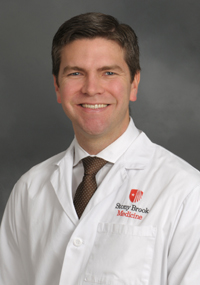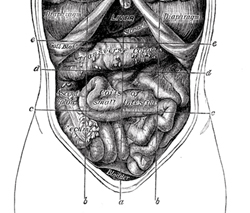
Hernias are a common health problem, with more than one million hernia repairs performed each year in the United States. Approximately 800,000 are done to fix hernias in the groin, and the rest are for other types of hernias in the abdomen.
A hernia occurs when there is a weakness, or opening, in the muscle and connective tissue that surround the belly area. Patients may feel a slight bulge, discomfort, or pressure as organs push out through this weakness.
While hernias are a common problem, their true incidence is unknown. It is estimated that 5% of the population will develop an abdominal wall hernia, but the prevalence may be even higher.
About 75% of all hernias occur in the groin. The prevalence of hernias increases with age. The likelihood of a life-threatening strangulated hernia, in which the blood supply to the bulging part of the intestine is cut off, also increases with age.
Here, Andrew T. Bates, MD, director of the Stony Brook Comprehensive Hernia Center, answers frequently asked questions about hernias and their treatment.
Q: What exactly is a hernia?
A: The abdomen is held together by a layer of tough connective tissue called fascia. A hernia is a gap, or weak spot, in this fascia that allows internal contents of the abdomen to sneak through.
Q: What are the symptoms?
A: Possible symptoms include: a slight bulge or lump in the affected area; a lump on either side of the pubic bone where the groin and the thigh meet; burning, gurgling, or aching sensations where the bulge is; a heavy feeling in the abdomen; pain or discomfort (usually in the lower abdomen), especially when bending over, coughing or lifting.
Sometimes the person doesn't feel any symptoms at all, and the hernia is discovered during a routine physical or a medical exam for an unrelated problem.
Q: How does a hernia happen?
A: Some hernias are present at birth and lie dormant for years, suddenly "popping out" during straining or pushing. Other hernias develop slowly from accumulated strain, such as repeated heavy lifting. For most patients, it's a combination of the two.
The abdominal wall has several natural weak spots, such as the belly button and the groin (in men), and hernias sometimes happen there. If you have ever had abdominal surgery, your old incision is a place where a hernia could form.
Hernia repairs done by experienced surgeons like ours provide the best results
with low recurrence rates and minimal post-op pain.

Q: Are hernias dangerous?
A: They can be. A hernia can become an emergency medical situation if abdominal contents, especially intestine, herniate through the gap and become stuck. If that happens, the stuck contents can cut off their own blood flow.
Typically, if a hernia is painful, the pain rarely resolves without surgery and will probably get worse.
For patients with a hernia that does not bother them, we must make the decision whether or not to perform surgery. We do know that a significant percentage of patients who have no pain now will develop symptoms later on and require repair.
Q: How are hernias fixed?
A: When it comes to hernias, one size certainly does not fit all. Hernias in the groin often require different surgeries from those on the abdominal wall.
Depending on the size, location, and configuration, your surgeon may use various prosthetic meshes or closure techniques. The most appropriate repair for your hernia may be a traditional open surgery, laparoscopic or even robotic.
The best way for your surgeon to advise you is to have a detailed conversation about your medical and surgical history and perform a complete physical exam.
Q: What type of repair is best?
A: Research has shown that what matters most is your surgeon's experience with a particular technique. The best open surgeon is better than a mediocre laparoscopic surgeon, and vice versa.
Traditional and laparoscopic surgeries produce similar and excellent outcomes when performed by a well-trained surgeon.
Q: Is it bad to use surgical mesh in repairing hernias?
A: In short, no. Hernia mesh is very different than the mesh discussed in some advertisements that can alarm patients.
Although non-mesh options exists, using a prosthetic mesh for hernia repair is the standard of care in most cases. Using a patch made of surgical mesh lowers the chance of the hernia coming back after surgery, which has been proven consistently by several research studies nationwide.
Most meshes are permanent and will become incorporated in the abdominal wall, adding permanent strength.
Suturing the patient's own tissue back together, without using a mesh patch, is done in the procedure called the Shouldice repair.
Our experienced hernia experts work together as a team to design the best treatment plan possible so patients can get back quickly to their normal lives and daily activities.
Q: Can a "hernia belt" sold in medical supply stores help?
A: This is called a hernia truss. It provides pressure on the hernia so it does not pop out. Although this can prevent an emergency, it does not fix the underlying problem and surgery is still recommended.
Q: What is a "sports hernia"?
A: A sports hernia is actually a ligament/tendon injury in the groin. It may mimic the discomfort of a true hernia. Depending on severity and type, these hernias can be treated via surgery, anti-inflammatory medication/injections, or physical therapy.
Q: What is the advantage of having a hernia repair done at Stony Brook?
A: The advantage is two-fold: academic and comprehensive. By having your repair at an academic institution like Stony Brook Medicine, you take advantage of a surgery faculty that utilizes the newest techniques and, in many cases, is driving the field forward.
Our surgeons present their work at national societies, and have published countless articles about their research projects in respected surgical journals. As academic surgeons, we are committed to making surgery better.
"Comprehensive" means that all of your needs are addressed under one roof, delivered by a collaborative team dedicated to excellent patient outcomes.
Our center includes open, laparoscopic, and robotic surgery specialists. We work closely with plastic surgeons for those patients that may require complex repair.
We have also integrated pain management specialists into our treatment protocols for those patients suffering from debilitating hernia-related pain. When patient care is seamless as done here at Stony Brook, outcomes improve.
| The Stony Brook Comprehensive Hernia Center — distinguished by Stony Brook Medicine's multidisciplinary approach to patient care — offers a wide range of options to diagnose and treat most types of hernias. Our experienced hernia experts work together as a team to design the best treatment plan possible so patients can get back quickly to their normal lives and daily activities. Patients can see our hernia specialists at our Suffolk County offices in Centereach, East Setauket, Smithtown, and Commack. |
